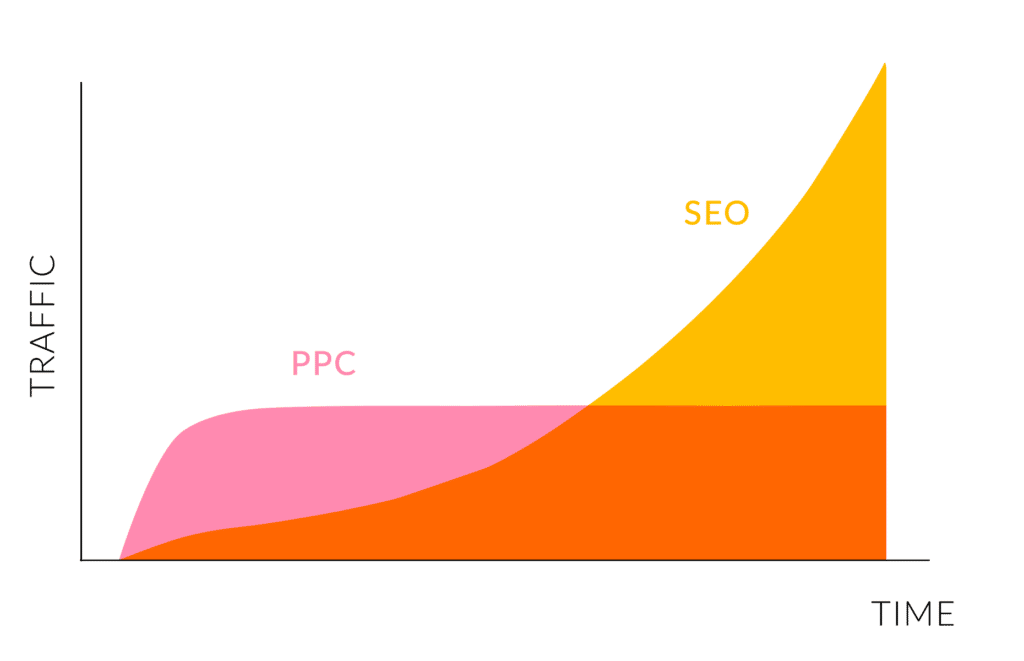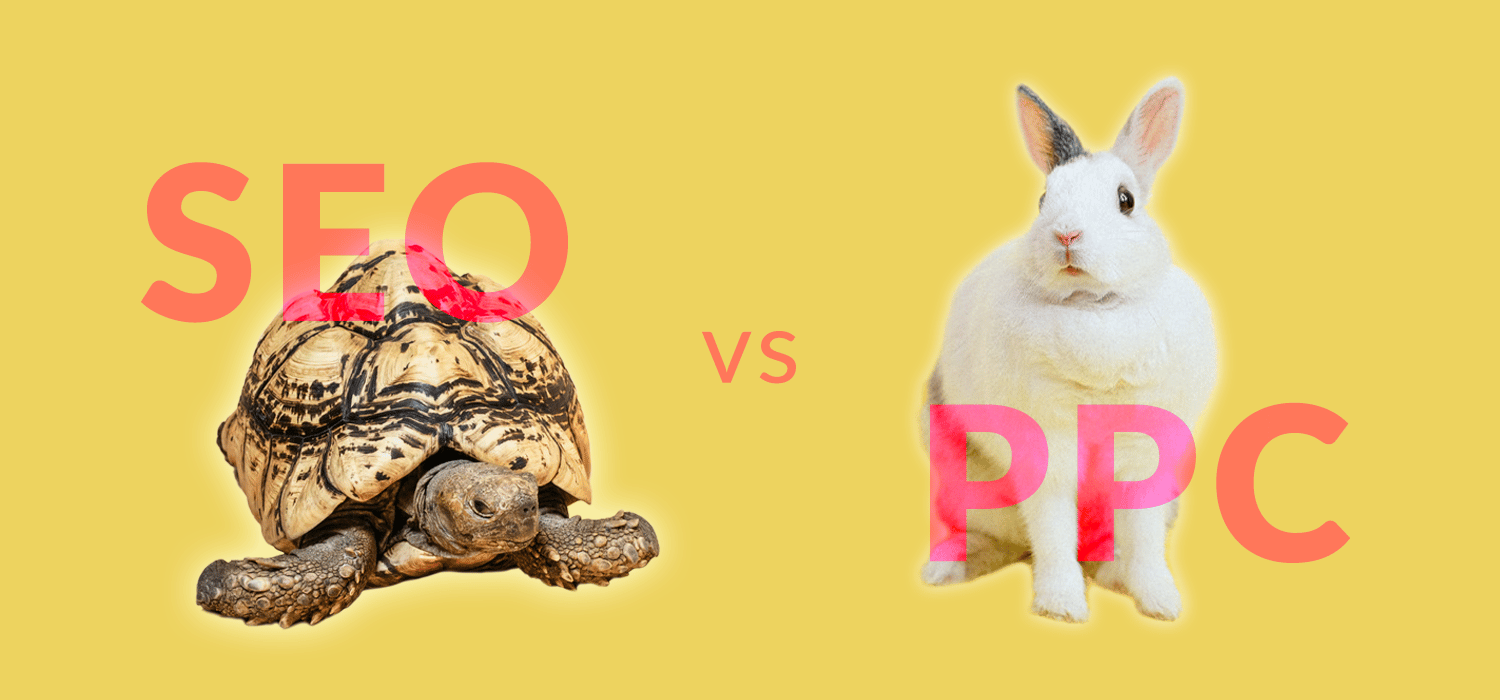In our experience as a digital agency, most clients interested in investing in Google search want to do advertising, and prefer leaving investment in SEO and organic search for a later stage. They want -and most startups need- results now. Today. Or at least tomorrow.
We believe that this strategy is short-term thinking.
A sustainable search marketing strategy needs long-term planning
Here’s the thing: The longer you delay investing in SEO the longer you’ll have to wait to reap its benefits. You need to consider the fact that SEO needs time to bear fruit. For an equal investment, SEO will yield much more traffic than ads in the long run (see graph below). During that time, you’ll want to invest in ads to bridge the gap. But how long do you want to be paying for ads?
This is one of the many situations in life in which long-term thinking pays off. Unfortunately, thinking short term makes you dependent on ad spending. As soon as you turn off the money tap, you’ll disappear from Google’s search result pages.

The cost of SEO
Even though you don’t pay for organic search results, getting there has a cost. You need to invest in a search-friendly website, and invest in someone (in-house or external) who can develop a strategy and create content that matches what your prospective customers are searching for. In other words, implement your strategy.
Yes, implement it.
Please.
It takes a while from the moment content is uploaded till it starts being ranked and getting the same amount of traffic you’d be getting through ads. But it also takes a while from when you decide you want to invest in SEO until the time the content is uploaded. And this time is often underestimated.
We advise starting with SEO as soon as possible while placing ads and waiting for organic traffic to replace paid traffic. But many startups do precisely the opposite.
Just having a strategy won’t take you anywhere if it’s not implemented. And ten blog articles won’t take you anywhere, really. You need to exceed a certain critical mass before Google considers you a sound expert in your business. Nobody knows how high that critical mass is. But anything under 100 pages of quality content probably won’t be enough.
If you’re going to stop doing SEO after you have a strategy and ten content pages, you might as well save the money to spend on those ads, which, by the way, will be more expensive if your website is not optimized for SEO.
Organic traffic grows over time
According to a study some time ago by Ahrefs, organic rankings improve with time, even years after going live. What does that mean for you? Well, if you invest in good content marketing today, your pages will not only consistently attract organic traffic but traffic will even increase years after you made your investment. Of course, this doesn’t mean you should neglect those pages and trust that they will do the trick forever. You need to keep your content updated and add more content regularly.
So, thinking long term is the key .
What’s the right strategy for Google search?
1. Decide whether SEO is the right channel for your business.
Do you sell something -a product or service- that people are looking for? Then SEO is right for you. Have you designed a new device that people have never heard of? Well, in that case, people will not be looking for it but they might be searching for possible solutions for a problem that your device can solve. In that case, you will want to meet your potential customers there. Another thing: Your device or product could become more popular over time and when people start searching for it, you will want to be there waiting for them in the search results. How many of us were looking for smartwatches 10 years ago?
We burn for SEO
If you sell a product or service that people aren’t searching for online (like regular toilet paper, first violins for an orchestra, a scenographer for a play in the theatre), then you’ll probably be better off investing in other channels.
2. Device a strategy for the right marketing mix
If you have decided that you want to be in search results for people looking for what you offer, you’ll need to consider who else is offering the same range of products or services in the SERPs. Is the competition fierce? Are you the first in your market? The latter is true for many startups. We usually advise them to occupy the SERPs as soon as possible. This way you’ll have the whole market to yourself for a while. But being there before others arrive will also give you the advantage of “seniority”. All other things being equal, Google will favor websites that have been around for longer.
3. Make an SEO content strategy and start implementing it… while investing in ads
But how long will it take you to get there? Creating content can take a long time, depending on the process you put into place. And uploaded content needs weeks or months to rank. It will certainly pay off if it’s good qualitative content and relevant to your business.
How will you bridge the gap?
Well, Google Ads is your friend. These Google Ads hacks will help you get more paid traffic and the smart bidding strategies will make them more efficient. Moreover, you’ll want to consider automating your ads if you have large accounts. Depending on your business, you should consider starting social media ads and simultaneously investing in other channels.
The longer it takes you to achieve the desired organic traffic threshold, the longer you will have to keep pouring money into ads. Does this mean you can stop investing in ads after reaching the desired rankings?
Not necessarily, but you’ll be able to reduce your SEA investment as your organic traffic increases. Furthermore, your cost-per-click will be lower if your site is optimized for SEO.
Beware of short-term thinking
Hence, we advise starting with SEO as soon as possible while placing ads and waiting for organic traffic to replace paid traffic. But many startups do precisely the opposite. They spend all their search budget on ads and leave organic search for a later stage, which will increase their total spending in the long run.
Is organic traffic as valuable as paid traffic?
Don’t fall in this trap. The trap of comparing apples with oranges. Don’t expect organic traffic to convert as well as paid traffic. While PPC strategies mostly target branded keywords and nonbranded money keywords (users are either searching for your brand or else really do want to buy your products), organic traffic reaches your site through a wider variety of keywords, mostly long-tail. SEO meets your customers along the funnel, from top to bottom, while paid focuses on the lower funnel. While a customer coming via paid traffic might have searched for a “red dress,” organic traffic reaching your site might have searched for “red dress”, or “What to wear to a cocktail party,” or even “how to get rid of sweat stains on a white blouse”. Traffic arriving via the keyword “red dress” is much more easily convertible. A good SEO strategy will, of course, target that keyword; it will also target other keywords ( for example, long-tail, informational queries). Traffic from informational keywords also fulfills other functions, like raising brand awareness and attracting potential customers earlier in the decision-making process, long before the customer decides that they want a red dress. How often have you purchased something when you were looking for something else? Exactly.
So, what should startups do about their search/SEM strategy?
First, hire a good digital marketing expert, either in-house or external. Then, explore all the options and channels, decide whether investing in SEO is right for you, and if it is, go for it as soon as possible so that you can reduce your advertising budget in the future.
You don’t know where to start your search for a digital marketing strategist? Look no further. Our growth marketing managers will devise a long-term strategy for you and make things happen transparently and sustainably.
Get an SEO expert on board







